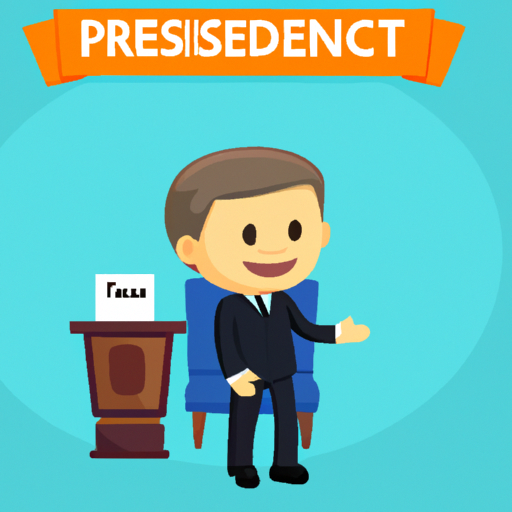The role of a President is an indelible cornerstone of democratic governance in numerous nations across the globe. As the head of state and government, the President holds a position of utmost importance and responsibility, tasked with steering the nation towards progress and representing its people on both domestic and international platforms. This article aims to explore the job description of a President, shedding light on the multifaceted duties and obligations that accompany this esteemed position. By delving into the constitutional and customary expectations associated with the role, we seek to provide a comprehensive understanding of the President’s pivotal functions, enabling readers to appreciate the complexities inherent in fulfilling the duties of the office.
Table of Contents
- Role and Responsibilities of a President
- Leadership Qualities and Skills Required for the Role
- The President’s Relationship with Congress and the Legislative Branch
- The President’s Role in Shaping Foreign Policy
- The President’s Influence on the Economy and Fiscal Policies
- The President’s Responsibility in Maintaining National Security
- The President’s Duty in Promoting Social Welfare and Equality
- Effective Communication and Public Speaking as a President
- Ethics and Integrity: Upholding the Highest Standards as President
- Closing Remarks

Role and Responsibilities of a President
In any country, the role of the President is of utmost importance as they are the head of state and play a crucial role in the governance and administration of the nation. As the highest-ranking official, the President’s primary responsibility is to uphold the constitution and ensure the smooth functioning of the government. This entails being the symbol of national unity, leading the executive branch, and representing the country on the international stage.
One of the key responsibilities of the President is to serve as the Commander-in-Chief of the armed forces. This role requires the President to make critical decisions regarding the country’s defense policies, oversee the military’s activities, and ensure national security. Additionally, the President also has the power to negotiate treaties with foreign nations, appoint ambassadors, and conduct diplomatic affairs to foster international relations.
- Executive power: The President exercises executive power and is responsible for implementing and enforcing laws.
- Legislative role: The President has the authority to propose legislation, veto bills, and deliver the annual State of the Union address.
- Judicial powers: The President can grant pardons, commuting sentences, and issuing reprieves for federal offenses.
- Appointments: The President has the power to nominate federal judges, cabinet members, and ambassadors with the approval of the Senate.
- National representative: The President acts as the face of the nation, representing it both domestically and internationally.
The President’s role and responsibilities are multifaceted, requiring exceptional leadership, decision-making skills, and a deep understanding of the country’s needs. It is a position of immense responsibility and influence, shaping the course of the nation and its future.

Leadership Qualities and Skills Required for the Role
The position of President requires a unique set of leadership qualities and skills to effectively carry out the responsibilities of the role. An exceptional President must possess the ability to inspire and motivate others, while also demonstrating strong decision-making skills and a clear vision for the future. Leading by example is crucial, as the President sets the tone for the entire organization and serves as a role model for others to follow.
To succeed in this role, a President must possess exceptional communication skills. The ability to communicate effectively and articulate ideas clearly is essential for conveying the organization’s mission and vision to a wide range of stakeholders, including employees, board members, and the public. Additionally, strong interpersonal skills are paramount for building and maintaining relationships, whether it’s collaborating with other leaders, negotiating with stakeholders, or resolving conflicts within the organization.
- Visionary: A President should possess a clear and innovative vision for the organization’s future.
- Decisive: The ability to make timely and well-informed decisions is crucial for a President.
- Inspiring: A great President has the ability to inspire and motivate others towards shared goals.
- Effective Communicator: Strong verbal and written communication skills are essential for a President to effectively convey the organization’s message.

The President’s Relationship with Congress and the Legislative Branch
As the head of the executive branch, the President’s role involves working closely with Congress and the legislative branch to ensure the smooth functioning of the government and the implementation of policies that benefit the nation. Building and maintaining a productive relationship with Congress is vital for the President to effectively fulfill their constitutional responsibilities and ensure the success of their agenda.
Collaboration:
- The President must engage in regular communication and negotiation with members of Congress to build consensus and garner support for their legislative initiatives.
- Collaboration between the President and Congress is essential for the passing of important bills, as Congress has the authority to create laws and shape policies.
- Both branches must work together to develop and refine legislative proposals through bipartisan cooperation, ensuring the best interests of the nation are prioritized.
Checks and balances:
- The President must respect the checks and balances established by the Constitution, which grants Congress the power to approve or reject presidential appointments, veto legislation, and oversee the executive branch through various committees.
- Congressional oversight serves as a crucial mechanism to hold the President accountable for their actions, promoting transparency and preventing the abuse of executive power.
- Through the legislative branch, Congress has the authority to investigate issues, conduct impeachment proceedings, and provide advice and consent on treaties.
is an essential aspect of the presidency, requiring effective cooperation, collaboration, and adherence to the principles of the Constitution. Together, they shape the course of the nation and ensure the democratic functioning of the United States government.
The President’s Role in Shaping Foreign Policy
The President is tasked with an integral duty of shaping foreign policies that safeguard national interest and promote global cooperation. Through diplomatic actions, negotiations, and international engagement, the President exercises leadership to impact the course of international relations. Here are key responsibilities and powers associated with :
- Appointment of the Secretary of State: As the nation’s top diplomat and foreign policy advisor, the President appoints the Secretary of State who plays a pivotal role in formulating and executing foreign policies on behalf of the United States.
- Treaty Negotiations and Ratification: The President initiates and negotiates treaties with foreign nations, subject to Senate approval. Through diplomacy, the President can foster alliances and trade agreements that advance national interests and promote peace and prosperity.
- Executive Agreements: The President is empowered to forge executive agreements with foreign leaders, independently of the Senate. These agreements cover a wide range of issues such as economic cooperation, security partnerships, and environmental pacts.
Furthermore, the President is responsible for managing diplomatic relations with other nations, overseeing foreign aid programs, and representing the United States in international conferences and summits. By harnessing the power of diplomacy, the President shapes foreign policy to ensure national security, preserve global stability, and pursue mutually beneficial relationships with nations around the world.
The President’s Influence on the Economy and Fiscal Policies
The President of a country holds significant influence over its economy and fiscal policies. As the chief executive, the President has the power to shape economic regulations, implement fiscal measures, and impact the overall financial wellbeing of the nation. Through their policies and decisions, the President can steer the direction of economic growth, job creation, and income distribution. Here are some key ways in which the President’s role affects the economy and fiscal policies:
- Setting the Agenda: The President plays a crucial role in setting the economic agenda for the nation. By highlighting key priorities such as investment in infrastructure, healthcare, education, or promoting innovation, the President can guide the direction of the economy and shape fiscal policies accordingly.
- Proposing and Enacting Legislation: The President has the power to propose and enact legislation that influences the economy. This includes introducing budgets, tax reforms, and other measures aimed at boosting economic growth, reducing unemployment, or addressing income inequality.
- Appointing Key Officials: The President appoints key officials such as the Secretary of the Treasury, Chair of the Federal Reserve, and members of various economic advisory boards. These individuals have substantial influence over monetary policies, regulations, and enforcement, thus affecting the overall economic landscape.
The President’s role in shaping the economy and fiscal policies is a complex and multifaceted responsibility. It requires strategic decision-making, collaboration with other branches of government, and an understanding of the potential consequences of various policy choices. Consequently, the President’s influence on the economy is a critically important aspect of their job, as it directly impacts the livelihood and economic opportunities available to citizens.
The President’s Responsibility in Maintaining National Security
As the President of a nation, one of the most crucial responsibilities is to ensure the maintenance of national security. This responsibility encompasses a range of actions and decisions that dictate the safety and well-being of the country and its citizens. The President plays a pivotal role in protecting the nation’s interests from both internal and external threats by employing effective strategies and utilizing various resources at their disposal.
First and foremost, the President is responsible for formulating and implementing comprehensive national security policies. This involves conducting careful assessments of potential risks, analyzing intelligence reports, and collaborating with intelligence agencies to gather vital information. By staying well-informed and informed, the President can then make informed decisions on matters such as defense budget allocation, deployment of military forces, and the establishment of diplomatic relations. Additionally, the President acts as the ultimate decision-maker during times of crisis or emergency, ensuring prompt and appropriate responses to any threats or attacks that may occur.
In order to fulfill this responsibility effectively, the President must also establish strong partnerships and alliances with other nations to foster international cooperation. By building mutual trust and understanding with foreign leaders, the President can work towards the common goal of global security and stability. This may involve participating in diplomatic negotiations, signing treaties, and actively engaging in international organizations such as the United Nations. Through these collaborative efforts, the President can leverage the collective strength and resources of multiple nations to combat shared threats, such as terrorism and the proliferation of weapons of mass destruction.
The President’s Duty in Promoting Social Welfare and Equality
The role of the President in promoting social welfare and equality is a critical aspect of their job description. The President carries the responsibility of ensuring that the citizens of the nation have access to essential services and resources, irrespective of their background or circumstances. By diligently working towards social welfare, the President aims to establish a just and equitable society.
One of the primary ways the President endeavors to promote social welfare and equality is by advocating for policies that address the needs of marginalized communities. This includes advocating for the expansion of healthcare services, affordable housing initiatives, and educational opportunities. The President also plays a vital role in fostering an inclusive society by promoting equal representation and protecting the rights of all individuals, regardless of their race, gender, or socio-economic status. By leveraging their position of influence, the President can inspire positive change and work towards creating a society where every individual has an equal opportunity to thrive.
Effective Communication and Public Speaking as a President
Effective communication and public speaking are critical skills for any President. As the leader of a nation, the President is responsible for conveying messages to the public, addressing the concerns of the citizens, and inspiring confidence and trust among the people. Through clear and persuasive communication, a President can effectively rally support for their policies and initiatives, foster unity among diverse groups, and navigate complex political landscapes.
One key aspect of effective communication for a President is the ability to deliver compelling speeches. A skilled public speaker can captivate an audience, convey their vision, and inspire action. Whether addressing a crowd at a political rally, giving a State of the Union address, or speaking at a diplomatic summit, a President must be able to articulate their ideas with clarity and conviction. Bold and confident delivery, coupled with a well-structured and organized speech, is essential for leaving a lasting impact.
- Deliver clear and concise messages:
- Adapt the message to different audiences:
- Use rhetorical devices to engage and persuade:
- Establish credibility through knowledge and expertise:
Another crucial aspect of effective communication for a President is the ability to connect with the public on a personal level. Building trust and rapport with citizens is essential for creating a sense of partnership and unity. An empathetic and relatable President can establish a strong bond with the people and demonstrate a genuine understanding of their needs and aspirations. This can be achieved through active listening, engaging in genuine dialogue, and showing empathy towards diverse perspectives. By doing so, a President can foster a sense of inclusivity and ensure their policies and decisions are rooted in the interests of the people they serve.
Remember: Being an effective communicator and public speaker as a President requires not only eloquence and confidence but also the ability to connect with people on a personal level and inspire them to action.
Ethics and Integrity: Upholding the Highest Standards as President
In the role of President, it is paramount to exemplify ethics and integrity, continuously upholding the highest standards of moral conduct. As the leader of a nation, it is crucial to lead by example and demonstrate a steadfast commitment to honesty, transparency, and fairness. Upholding these principles not only fosters trust and respect among the citizens but also sets a precedent for the entire nation.
As President, maintaining ethical conduct means adhering to a strong code of ethics that encompasses various aspects. It involves transparent and accountable decision-making processes, ensuring that all actions taken are based on sound principles and serve the best interests of the people. Operating within the confines of the law and instituting policies that promote justice and equality are of utmost importance. Additionally, it is vital to create an atmosphere of inclusivity, where diverse perspectives are respected and considered in the decision-making process. Preserving the highest standards of ethics and integrity enables the President to effectively govern and advocate for the welfare of the nation.
- Honesty and Transparency: The President should always communicate truthfully, disclosing information to the public and working diligently to prevent misinformation. Transparency ensures the citizens’ understanding and confidence in the decision-making process.
- Accountability: Holding oneself accountable for actions and decisions is a fundamental aspect of ethical leadership. The President should be willing to accept responsibility for mistakes and learn from them, promoting a culture of continuous improvement.
- Respect: Valuing the dignity and rights of every individual is essential. The President should demonstrate respect for diversity in all forms, fostering an inclusive and harmonious society.
- Adherence to the law: Upholding the law and enforcing it fairly is a key duty for the President. Abiding by legal and constitutional principles ensures a just and democratic society.
Closing Remarks
In conclusion, the role of the President holds great responsibility and importance within the political governance of a nation. As outlined in this article, the job description of the President encompasses a wide array of duties, including serving as the chief executive, head of state, and commander-in-chief. A President must exhibit effective leadership, strong decision-making skills, and a deep sense of loyalty to their country.
We have explored the various aspects of the President’s work, ranging from policy-making to representing the nation on the global stage. Additionally, the article has shed light on the President’s role in upholding the constitution, ensuring the functioning of democratic processes, and maintaining the well-being and security of the citizens.
While the specifics of the President’s job description may vary from country to country, the underlying principles of leadership, diplomacy, and responsibility remain constant. It is a position that demands dedication, resilience, and a commitment to serving the people.
In the end, understanding the job description of the President provides us with a deeper appreciation for the complexities and challenges inherent in this crucial role. It is a position that requires an unwavering commitment to the welfare of the nation, as well as the ability to navigate the often intricate landscape of politics and public opinion.
As citizens, it is our duty to remain informed about the role of the President and hold them accountable for their actions and decisions. By doing so, we contribute to the thriving of democratic ideals and ensure that the President’s actions align with the best interests of the nation and its people.
In conclusion, the job description of the President represents not just a set of responsibilities, but a symbol of hope, unity, and progress. The manner in which Presidents fulfill these duties can shape the destiny of nations and impact the lives of countless individuals.
